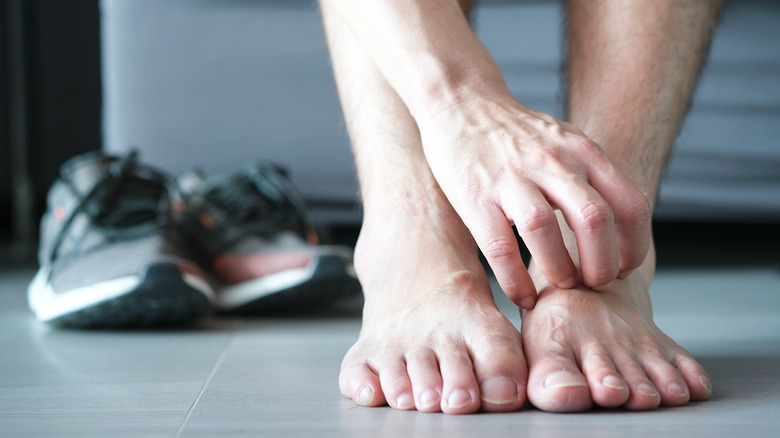What It Really Means When Your Foot Itches
An itchy foot can be maddening. It's one of those hard-to-reach places that's often barricaded behind our socks and shoes, making it almost impossible to scratch. While an itchy foot can sometimes stem from a health condition, other times, that itchiness may be a product of external factors. For example, according to Buoy Health, a case of itchy feet can often be attributed to pests, such as mosquitoes, bed bugs, or mites.
Aside from environmental factors, an itchy foot may be a symptom of certain mild to moderate health conditions. K Health states that dry skin, eczema, psoriasis, a scar in the process of healing, or fungal infections, such as Athlete's foot, can all lead to the desire to scratch. Another common cause of an itchy foot is contact dermatitis. In these cases, exposure to allergens or irritants such as those found in soaps, shoe rubber, cosmetic nail products, play mats, and more, can all prompt itching and irritation on the feet (via Amarillo Foot Specialists). Interestingly, even the color of your socks may be behind your urge to scratch. Experts say that a dye used in the making of dark-colored socks is one such irritant known to cause itchy feet.
When to see a doctor for itchy feet
While we all get an itchy foot from time to time, in some cases, itchy feet may be related to a more serious health condition. For instance, itching located on the soles of the feet could be a symptom of peripheral neuropathy — a disorder that causes aggravation of the nerves (via Buoy Health). Similarly, excessive itchiness on the soles of the feet may also be an indication of kidney disease due to a buildup of urea. In this case, itching may also be accompanied by swelling of the ankles or feet. Liver disease can also present with similar symptoms.
For milder cases of itchy feet, K Health offers suggestions for alleviating irritation and discomfort, such as applying a damp, cool compress to the area, utilizing an alcohol-free lotion, or soaking feet in apple cider vinegar. However, in the event that you experience regular flare-ups, itching on large areas of the body, or itching that lasts for more than three weeks, be sure to consult with your physician. You should also see a doctor if itching interferes with your day-to-day functioning, or if you notice the emergence of additional symptoms including infection, swelling, or a rash. A healthcare professional can help determine whether or not your foot itching may be related to an underlying health condition.


